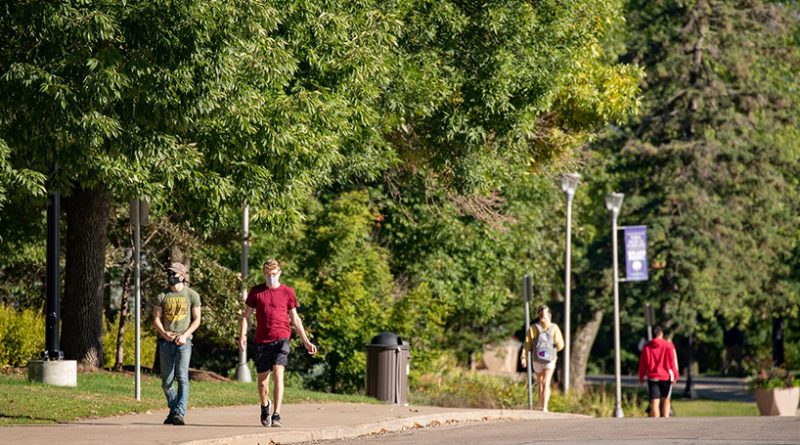UWSP prepared to ‘pivot’ if COVID cases spike
By Patrick Lynn
UW-Stevens Point is managing the number of COVID-19 cases on campus and has plans to adapt as needed to changing circumstances, the school said in a news release on Sept. 22.
“With some universities shifting to virtual classes and quarantining entire residence halls, the community may be wondering ‘when will that happen at UW-Stevens Point?'” said Chancellor Bernie Patterson.
Patterson said he can’t answer that question just yet.
“What we know is this: UW-Stevens Point has implemented numerous precautions to keep students, employees, and the community safe and to contain the spread of COVID-19,” he said. “We also are prepared to pivot quickly to online learning if it becomes necessary.”
Any decision to move all classes online depends on several factors, including the number of COVID-19 cases, the university’s capacity to isolate and quarantine residence hall students who test positive or are close contacts of those with COVID-19, and ICU capacity in local hospitals. Three-fourths of that designated isolation and quarantine space remains available on campus.
“We monitor and analyze COVID-19 indicators daily with an eye on dealing with present situations and future possibilities,” Patterson added. “We consult with and follow recommendations of state and local health officials and UW System to determine how to best respond to any changes in operations for the health of our campus communities.”
The school is offering biweekly antigen tests for students living in residence halls to “help quickly identify individuals who are asymptomatic yet may be spreading the virus,” he said.
Students who have COVID-19 symptoms should contact Student Health Service for evaluation and diagnosis through PCR testing. If residence hall students need to isolate or quarantine, meals and support services are provided.
But about 57 percent of school’s more than 175 positive cases are among students who live off-campus, according to the university. Patterson said the university expects students who live or socialize in the community to follow university policies about social distancing and wearing face-coverings both on- and off-campus.
Off-campus, university leaders have provided posters to local businesses encouraging students to “Stay a Stevie Apart” and wear face coverings. The university has also met with the Portage Co. Tavern League to encourage indoor capacity limits, is producing a public service announcement on face coverings with local county health departments, and has partnered with the county health department to employ contact tracers for COVID-19 cases involving university students.
Efforts on campus include completing a daily symptom screening before coming to campus, requiring face coverings, physically distancing from others, reducing the capacity of classrooms by 70 to 80 percent, limiting meeting spaces and guests in residence halls, increasing cleaning and personal hygiene protocols.
“We are working to reduce the impact of COVID-19 on our campuses and in our communities. With the number of cases rising in Wisconsin and nationwide, every one of us needs to do our part,” Patterson said.


